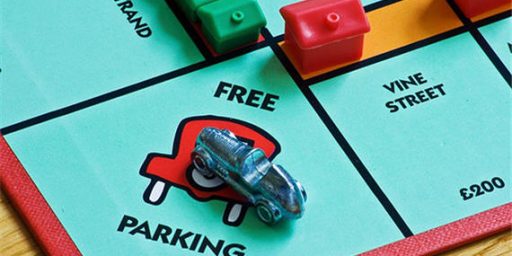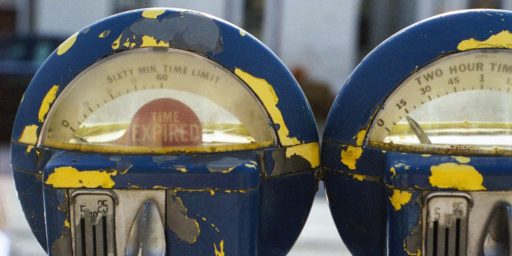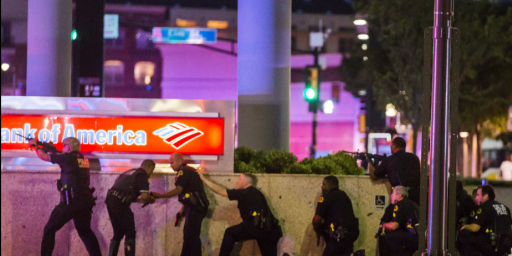Commuting Ressentiment
My recent post on the D.C. public transit fee debate generated an unusual amount of commentary for a weekend post. Judging by the tone of some of the discussion, there’s clearly an emotional component to the discussion of which I was only vaguely aware.
Megan McArdle agreed with my analysis of the economic incentives and remarked,
The massive subsidy provided to drivers in the form of free roads is obviously producing highly inefficient outcomes, which is why DC feels like a prison from which it is impossible to escape unless one wants to spend four hours on the Beltway. We clearly need to institute comprehensive road tolls combined with a congestion pricing scheme. Plus, of course, a carbon tax to compensate for the negative externalities drivers are imposing on those of us who use primarily mass transit.
What’s interesting about this is the presumption that people who use mass transit paid for by the taxpayers are somehow more virtuous than those of us who buy our own vehicles, pay to maintain them, and pay all manner of taxes for the privilege. Indeed, this may be the only case where those who rely on government for something feel smugly superior to those who pay their own way.
To be sure, as my original post noted, the roadways are paid for by the taxpayers. While various user fees apply, there’s certainly some aspect of subsidy involved. Then again, that’s obviously true for public transit as well.* [See Update]
The vast majority of those who take subways and public buses to work make that choice, not out of altruism, but because it makes the most sense to them given their situation. Some simply can’t afford the cost of buying and maintaining a car. Most, though, are simply urban dwellers who live their lives within a very small geographic area where parking is very expensive and driving is very slow and inefficient. For most Americans, conversely, it simply makes no sense to rely on public transit. We live outside the handful of cities with excellent rail systems. Land and therefore parking is very cheap. Our home, work, shopping, and recreation are often spread out over long distances.
For young, single people working in New York, Chicago, or Washington, living downtown and relying on public transportation is not only efficient but fun. There’s a densely packed social network, lots of bars and restaurants, and so forth within minutes of you. Marriage, children, and other lifestyle changes tend to bring into sharper focus the downsides of living downtown.
My wife and I both work in different towns. When we bought our house a little over a year ago, neither of us worked in D.C. I was working for myself in a home office, so my commute was a non-factor in the decision. We found a place that was relatively affordable, in a community we liked, within less than fifteen minutes of where she worked. Now that I’m driving to D.C. four times a week, the location is somewhat less ideal but certainly not enough so to warrant moving.
A few of the commenters on Megan’s post and mine note the serenity of the subway ride vice the drive. That’s largely a function of personality, I suppose. While many people can read or zone out with their iPods, I find it very difficult to relax on the Metro, which is loud and crowded and constantly jostling. By contrast, unless traffic is especially horrendous, my drive in and out of D.C. is fairly pleasant. The weather’s been such that I can put the top down and enjoy the sun and wind and I’ve got satellite radio and other amenities to while away the time.
Another strain of comments focused on the “why would you live somewhere where it takes an hour to drive thirteen miles” angle. That, again, is a lifestyle choice. There are jobs that essentially don’t exist outside of a handful of major cities. Indeed, my wife and I now both work in fields that are very national capitol-dependent (she’s in political polling, I’m in the foreign policy business). Doing what we do more or less requires living in the D.C. Metro area.
Some point out, correctly, that by figuring only what I’m paying for gasoline and parking skews the economic calculation in favor of driving, since I’m ignoring the depreciation on my car, maintenance, and so forth. I tend to view those as essentially fixed costs, since I’m going to need a car anyway, but it’s certainly true that that should be factored into the analysis. As the gist of my post made clear, though, time and stress are the far more important variables for me; for those in different financial circumstances, though, it’s an important point.
Life’s ultimately about trade-offs. There are some serious advantages and disadvantages to living downtown in a major metropolitan area, in the suburbs, or in rural areas far from the hustle and bustle. Ultimately, each of us must make those decisions based on our aspirations, means, and opportunities. It strikes me as odd, though, to condemn those who make other choices than the ones that suit us.
UPDATE: Peter Jackson links to some DOT Bureau of Transportation Statistics data which shows that, in fact, passenger car drivers actually pay more in user fees per 1000 miles driven than they receive in federal subsidies whereas mass transit gets huge subsidies. Megan argues that the data is misleading and irrelevant.






While you are absolutely correct on the subject of fixed versus variable cost of driving, you’re massively understating the effect of the subsidies for driving – and the effect it’s had on our cities. Urban drivers see their gas taxes sent outwards to sprawl highways rather than being spent on maintenance or transit; and urban non-drivers in most states even end up paying for freeways whose primary benefit is for the suburban commuter.
The subsidy equation is monstrously in favor of driving – it’s not even close.
I write on this stuff a lot – from the perspective of Austin – but the message is the same in DC (sales tax funding highways; urban area getting screwed; etc.).
Excellent post! Living just across the border from DC, I don’t have to worry about the Beltway. I do use the Metro to get around in the city so I don’t have to worry about parking. But I’ve always been a little uncomfortable with the fact that the Metro isn’t a business that can pay for itself.
If tolls should be put up on all roads (so that tax payers aren’t subsidizing drivers) as some suggest, shouldn’t the fares on the Metro be raised to the point where tax payers don’t have to subsidize it either? Or do people who propose tolls on the roads simply want to force people into the lesser of two evils (i.e. the Metro), and think we won’t be a righteous society until everyone walks everywhere?
*ponders* It would be an interesting position, if anyone actually holds it.
The problem with DC is that WMATA, the agency responsible for the metro and buses, does such a lousy job. Other major cities such as NYC or Chicago have multiple networks of subway and buses for the urban dwellers, as well as a comprehensive suburban bus and rail network which quickly gets commuter in and out of the city center from the suburbs. Here in DC we have a gold plated metro system which has already reached capacity (never mind the disastrous Silver Line extension to Dulles on the already packed Orange Line). Suburban trains like the MARC and VRE run very limited service and are limited by the freight company (CSX) which own and control the traffic on its tracks. A simple concept like express buses going downtown escapes our transportation planners. If LA can have such buses (for example the Foothill Transit buses zooming down the express lanes on I-10), why can’t we? I live near Centreville, VA, which is a 25 mile straight shot down I-66 to DC. But we’re forced to take the infrequent feeder buses to the already crowded metro at its Vienna terminus, all in the plan to get more metro revenue. Don’t even get me started on WMATA.
I am always annoyed by the smug suggestion that it’s OK to live in cities for a while but once you grow up and learn to be responsible you’ll see the qualities of the suburbs. It’s a very condescending idea. You make your lifestyle choices and I can make mine and we can each do so without insulting the other.
It’s a fallacy to suggest that children == cars. It’s very easy to carry a baby and then, through some magical force, they learn to carry themselves. Truly, it’s a miracle.
While I would agree that many, even most places in the USA are unfit for bicycling because of conscious choices made in favor of the motorist, that situation is not universal. Look at Portland, which is not exactly sunny and compact, and you will see that the mode share for bicycling is 5%, not insignificant. And bicycling there is growing by leaps (21% annually) while motoring is in decline.
All cities make planning decisions that can overtly or inadvertently skew the economic inputs to the the decisions of where to live, where to work, and how to move around. The choices people make are largely baked in before the deliberation even begins. Some people live in cities where no choice exists but to drive. Some people have choices but are unaware of them. Others, in other cities, can exercise their option to ride the bus or train or to walk or bicycle.
That’s not my point at all. It’s just that the advantages and disadvantages carry different weights under different social circumstances. It’s perfectly doable to raise children in, say, Manhattan. Many people, though, decide they’d rather live in the Connecticut suburbs for a variety of reasons.
My point is merely that people make choices based on their priorities and that we shouldn’t condemn people for not coming to the same conclusions.
For middle class parents who want decent public education for their kids, the DC public school system is not an option. Yes, there are some good public schools in DC, but they are clustered around NW, which is not affordable for most middle income families. Fairfax and Montgomery Counties have excellent schools, and their reputations lead many families to move into those jurisdictions. In my case, the schools are the #1 reason for staying in Fairfax County.
Absolutely! I have turned down job offers from DC, Chicago, several places in the north east and California for the one reason that I don’t like the lifestyle in those locations, in addition to the politics (I need a gun-friendly environment).
Excellent post, Mr. Joyner, keep them coming.
there’s certainly some aspect of subsidy involved. Then again, that’s obviously true for public transit as well.
Given, as you’ve noted, that roads are everywhere and public transit systems are limited and isolated, I think you’re underestimating the fact that driving is, in fact, hugely subsidized. Roads are in no way a “business that can pay for itself.” Quibbling over the math over which is more subsidized doesn’t change the fact that public spending on transportation doesn’t just reflect public priorities, it also determines the options available.
Absolutely! And it’s not as if you said you didn’t like Macs or something…
James, What is your data source for these assumptions?
If you look at the recent study by the American Public Transportation Assn. of the demographics of transit riders [A Profile of Public Transportation Passenger Demographics and Travel Characteristics
Reported in On-Board Surveys] you see basic data that contradicts many of your assumptions.
The majority of riders are people of color. The median household income is $39,000–$5000 lower than that of the population as a whole. More than half public transportation riders have household incomes less than $50,000. Only 45.4% have access to a car when deciding to make a transit trip.
In the 13 years that I served on our town board, every dime spent on steets was paid for with motor fuel tax money.
Choosing a car over mass transit, in just about any urban area in this country,is like choosing the stairs over the elevator. There are advantages, but they are seldom worth it.
On the other hand if you don’t live in an urban area, the only place mass transit appears is on your TAX bill![lol]
BTW; Busses drive on public roads and most mass transit trains are placed in roadway right-of-ways.
My guess is that mass transit riders pay a smaller percentage of their travel expenses than drivers pay of theirs, including the share of taxes paid by each for each.
Then you live in a very special place indeed. The national numbers clearly state otherwise, and my experience everywhere I’ve lived (3 states) as well as everywhere I’ve cared enough about to research, has been the opposite. Perhaps you could share more details?
The overall subsidy for drivers is orders of magnitude higher than the overall subsidy for transit. And, no, the fact that buses “use the road” doesn’t mean that road spending by non-fuel-tax means is thus just and fair – a transit network using roads would rarely need more than 2 lanes, and would look radically different in other ways as well.
Presumably, that’s skewed by bus ridership, which is the only form of public transit outside a handful of densely populated areas.
Choosing a car over mass transit, in just about any urban area in this country,is like choosing the stairs over the elevator. There are advantages, but they are seldom worth it.
What urban areas have you lived in? I grew up in Houston and live near downtown Austin and you’d be crazy to rely on public transportation. Neither city has the public transportation infrastructure, Houston is too spread out, neither city has expensive parking (almost always comes with housing), and there are more job opportunities outside downtown than inside of it (both places).
According to the report I cited above, for rail riders the stats look like this:
Rail riders are only 42% White, 50.2% have household incomes under $50,000, and 57% have vehicle availability for their trips.
Interestingly, only 38% of bus riders have access to alternative vehicles.
It is also important to remember that bus ridership is huge in many areas with decent rail systems. In DC, for instance, 470 million trips were taken on buses or bus/rail transfers last year as opposed to just 209 million rail-only trips.
In Chicago, for FY 2005 there were 186 million rail bordings as opposed to 303 million bus bordings.
Interestingly,
The fact of the matter is that taking public transportation is almost always more time consuming than driving yourself. Taking two methods, such as the METRO and a bus and you can write off a lot of dead time. The Poor sacrifice time to save the monetary cost but as the value of an individual’s time increases the likelihood of them driving increases. Not only is auto travel generally as fast or faster, you do not have to forgo luxuries such as a cup of coffee or the ability to make calls in private. Also, use of public transportation costs time in that you can’t deviate to handle errands or easily break routine for a sick child. Unless your life is limited to the transit path.
In general, with subsidized transit, the population sorts into the rich in the urban center, the poor out to the edge of the transit system (within walking distance of stations) then the middle income beyond. See Edward Glaeser’s paper on why the poor live in cities. The rich can afford the cost of living in the city center and pay for the convenience of walking to work. The poor utilize the transit system sacrificing time for cost savings. The middle class who wish to own a home end up in suburbia and value their time either for economic gain, efficiency or with family to the extent that the cost of fuel and parking overwhelm any subsidized savings from mass transit.
While I don’t have the same sort of philosophical objections to publicly-financed roads that Megan has, I do see federally funded roads as a major problem. I don’t have a problem with public roads but I do have a problem with taxing the citizens of New Jersey to pay for roads in Alaska or Hawaii (which have, by definition, no interstate highway traffic).
Note, too, that the Interstate Highway System, as presently constituted comprises an enormous subsidy to real estate developers, car manufacturers, and oil companies.
Peter Jackson’s figures are bogus – here’s a link to a recent study on the matter (Delucco):
http://mdahmus.monkeysystems.com/blog/archives/000441.html
An interesting study, which is contrary to the point Peter Jackson is trying to make, was done by Delucchi at UC Davis, who has written hundreds of papers on the topic.
http://www.its.ucdavis.edu/people/faculty/delucchi/index.php
Delucchi concludes that the subsidy to motorists is roughly 20-70 cents per gallon of gas, working on the basis that the gas tax is a reasonably direct proxy for road user fees.
What always suprises me is that whenever people are proposing various fees or taxes to encourage use of mass transit, no one ever points out that what they’re actually arguing is that automobiles are a perk that should be restricted to the wealthy and that the working poor need to be prevented from being able to afford one.
“”What urban areas have you lived in?””
“”””””””””””””””””””””””””””””””””””””””””””””””””””””””””””””””””””””””””””””””””””””””””””””””””””
R.ALEX;
None, thank God! And when I travel I take the by-pass when possible. I do, however find myself compelled to enter a city from time to time. A simple trip to the city usually requires about $50 for tolls and parking and two hours or more to go the 15-20miles from downtown to the city limits when leaving. It is not dificult to keep this boy “down on the farm” and I can see the city lights from here![lol]